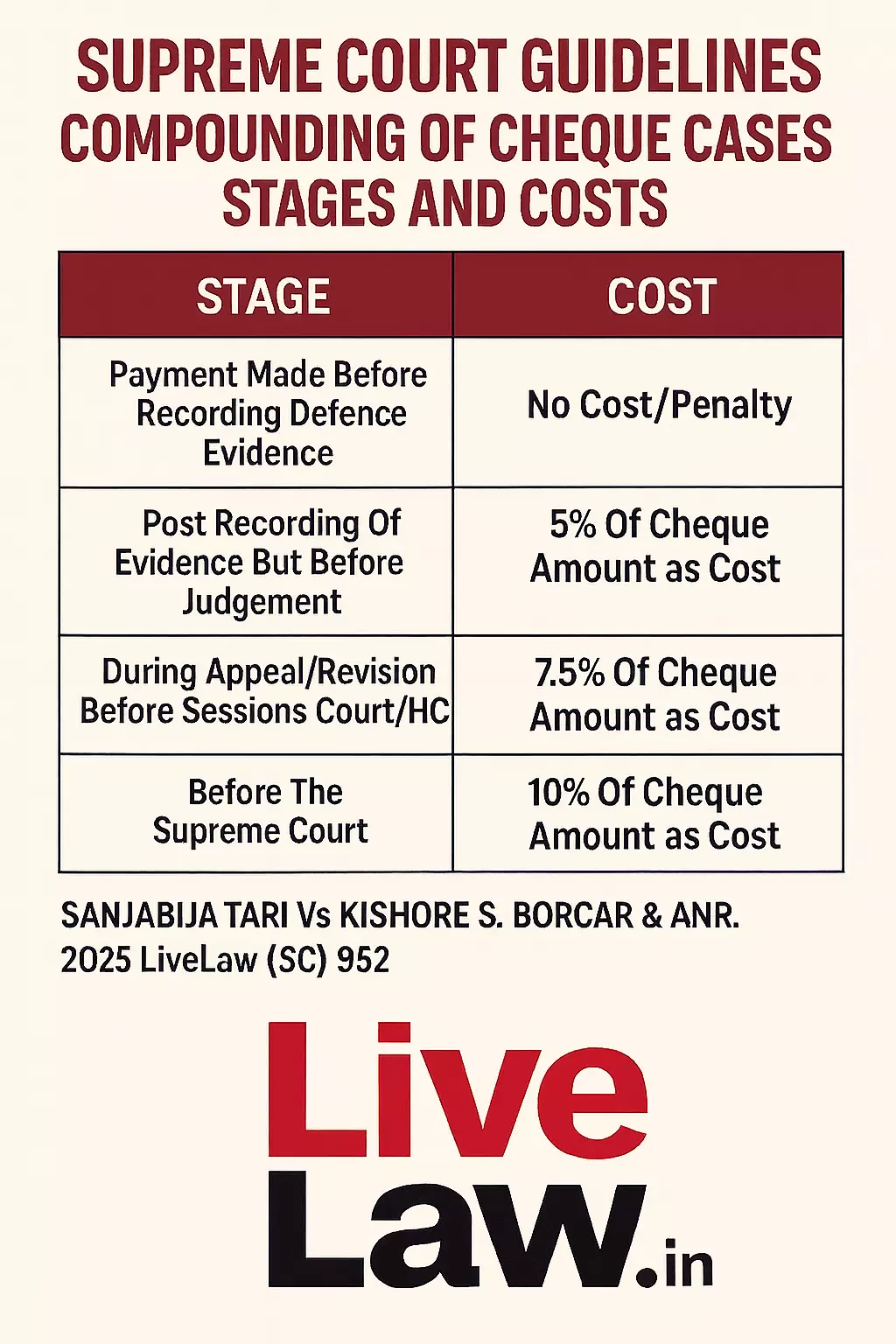- Home
- /
- Top Stories
- /
- Supreme Court Modifies Guidelines...
Supreme Court Modifies Guidelines On Compounding Of Cheque Dishonour Cases
LIVELAW NEWS NETWORK
26 Sept 2025 11:18 AM IST
The Supreme Court has recently modified the guidelines on compounding dishonour of cheque Cases issued in Damodar S.Prabhu vs Sayed Babalal H.The Supreme Court bench comprising Justice Manmohan and Justice NV Anjaria in Sanjabij Tari Vs Kishore S Borkar and another 2025 LiveLaw (SC) 952, observed that since a very large number of cheque bouncing cases are still pending and interest rates...
The Supreme Court has recently modified the guidelines on compounding dishonour of cheque Cases issued in Damodar S.Prabhu vs Sayed Babalal H.
The Supreme Court bench comprising Justice Manmohan and Justice NV Anjaria in Sanjabij Tari Vs Kishore S Borkar and another 2025 LiveLaw (SC) 952, observed that since a very large number of cheque bouncing cases are still pending and interest rates have fallen in the last few years, the Court is of the view that it is time to 'revisit and tweak the guidelines' issued by Supreme Court in Damodar S.Prabhu vs Sayed Babalal H.
Guidelines
(a) If the accused pays the cheque amount before recording of his evidence (namely defence evidence), then the Trial Court may allow compounding of the offence without imposing any cost or penalty on the accused.
(b) If the accused makes the payment of the cheque amount post the recording of his evidence but prior to the pronouncement of judgment by the Trial Court, the Magistrate may allow compounding of the offence on payment of additional 5% of the cheque amount with the Legal Services Authority or such other Authority as the Court deems fit.
(c) Similarly, if the payment of cheque amount is made before the Sessions Court or a High Court in Revision or Appeal, such Court may compound the offence on the condition that the accused pays 7.5% of the cheque amount by way of costs.
(d) Finally, if the cheque amount is tendered before the Supreme Court, the figure would increase to 10% of the cheque amount.
The above guidelines were issued by a The Bench also held that if the Accused is willing to pay in accordance with the aforesaid guidelines, the Court may suggest to the parties to go for compounding.
“If for any reason, the financial institutions/complainant asks for payment other than the cheque amount or settlement of entire loan or other outstanding dues, then the Magistrate may suggest to the Accused to plead guilty and exercise the power under Section 255(2) and/or 255(3) of the Cr.P.C. or 278 of the BNSS, 2023 and/or give the benefit under the Probation of Offenders Act, 1958 to the Accused”. remarked the Court.
As per the guidelines in the Damodar Prabhu judgment, if the compounding was made at first or second hearing, there was no cost. 10% of the cheque amount had to be paid as cost if the compounding was at a subsequent stage before the Magistrate. If it was before the Sessions Court or High Court, the cost was 15% of the cheque amount. If it was before the Supreme Court, the cost was 20%.
Now these guidelines have been modified as under :

Read the other guidelines issued by the Court on conducting Dishonour of Cheque Cases here
Also from the judgment - S.138 NI Act - Cheque Bounce Case Maintainable Even For Cash Loan Above ₹20,000 : Supreme Court Sets Aside Kerala High Court Ruling
Appearances: Advs. Amarjit Singh Bedi for the appellant; Ankit Yadav for the respondent.
Case : SANJABIJ TARI v. KISHORE S. BORCAR & ANR
Citation : 2025 LiveLaw (SC) 952
Read the Judgment here



